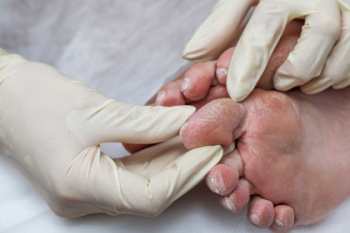Connect With Us

Charcot-Marie-Tooth disease is a rare inherited disorder that affects the peripheral nerves, which are responsible for controlling muscles and relaying sensory information. This condition gradually damages the nerves, often leading to muscle weakness and decreased sensation in the feet and lower legs. People with Charcot-Marie-Tooth may develop high arches, curled toes, and an abnormal gait due to the weakening of foot and leg muscles. Over time, the condition can result in balance issues, foot deformities, and difficulty walking. Symptoms often begin in childhood or early adulthood and typically progress slowly. While there is no cure, treatment options like custom orthotics and supportive footwear can help manage discomfort and improve mobility for those living with this lifelong condition. If you have this condition, it is suggested that you are under the care of a podiatrist who can help you to manage Charcot-Marie-Tooth disease.
Some foot conditions may require additional professional care. If you have any concerns, contact Ali Davis, DPM of The Foot Clinic. Our doctor can provide the care you need to keep you pain-free and on your feet.
Rare Foot Conditions
The majority of foot conditions are common and can be treated by a podiatrist. Standard diagnostic procedures are generally used to identify specific conditions and treatment can be rendered. A podiatrist also treats rare foot conditions which can be difficult to diagnose and may need extra attention and care.
There are many rare foot conditions that can affect children. Some of these can include:
- Freiberg’s disease
- Kohler’s disease
- Maffucci syndrome
Freiberg’s disease - This can be seen as a deterioration and flattening of a metatarsal bone that exists in the ball of the foot. It typically affects pre-teen and teenage girls, but can affect anyone at any age. Symptoms that can accompany this can be swelling, stiffness, and the patient may limp.
Kohler’s disease - This often targets the bone in the arch of the foot and affects younger boys. It can lead to an interruption of the blood supply which ultimately can lead to bone deterioration. The patient may limp or experience tenderness, swelling, and redness.
Maffucci syndrome - This affects the long bones in a child’s foot leading to the development of abnormal bone lesions. They are benign growths and typically develop in early childhood and the bones may be susceptible to breaking.
A podiatrist can properly diagnose and treat all types of rare foot conditions. If your child is affected by any of these symptoms or conditions, please don’t hesitate to call our office so the correct treatment method can begin.
If you have any questions please feel free to contact our office located in Overland Park, KS . We offer the newest diagnostic tools and technology to treat your foot and ankle needs.

Diabetes can cause serious problems in the feet, even from small cuts or pressure points. High blood sugar affects blood flow and nerve health, which means injuries may go unnoticed and heal slowly. Common issues include dry skin, numbness, tingling, and sores that do not heal. Without proper care, these problems can lead to infection or more serious complications. Checking your feet daily, wearing well-fitting shoes, and keeping skin moisturized can help prevent trouble. Regular visits to a podiatrist are also important to catch problems early. Even if your feet feel fine, changes can happen quickly. If you have diabetes and notice redness, swelling, or a sore that is not getting better, it is suggested you see a podiatrist for appropriate treatment.
Diabetic foot care is important in preventing foot ailments such as ulcers. If you are suffering from diabetes or have any other concerns about your feet, contact Ali Davis, DPM from The Foot Clinic. Our doctor can provide the care you need to keep you pain-free and on your feet.
Diabetic Foot Care
Diabetes affects millions of people every year. The condition can damage blood vessels in many parts of the body, especially the feet. Because of this, taking care of your feet is essential if you have diabetes, and having a podiatrist help monitor your foot health is highly recommended.
The Importance of Caring for Your Feet
- Routinely inspect your feet for bruises or sores.
- Wear socks that fit your feet comfortably.
- Wear comfortable shoes that provide adequate support.
Patients with diabetes should have their doctor monitor their blood levels, as blood sugar levels play such a huge role in diabetic care. Monitoring these levels on a regular basis is highly advised.
It is always best to inform your healthcare professional of any concerns you may have regarding your feet, especially for diabetic patients. Early treatment and routine foot examinations are keys to maintaining proper health, especially because severe complications can arise if proper treatment is not applied.
If you have any questions please feel free to contact our office located in Overland Park, KS . We offer the newest diagnostic and treatment technologies for all your foot and ankle needs.

The foot contains many small muscles, called intrinsic foot muscles, that help support the arch, control movement, and keep the foot stable during walking or running. Newer studies suggest that training these muscles can improve foot strength and function, especially in people with flat feet, foot pain, or balance issues. Simple exercises like toe curls, towel scrunches, or trying to spread the toes apart can help activate and strengthen these muscles. Over time, this kind of training may reduce strain on larger muscles and improve how the foot absorbs impact. It may also help with posture and reduce the risk of injury during activity. Although research is still growing, early findings are encouraging. If you experience foot fatigue, arch problems, or feel unsteady on your feet, it is suggested that you see a podiatrist for a diagnosis and appropriate treatment.
Exercising your feet regularly with the proper foot wear is a great way to prevent injuries and build strength. If you have any concerns about your feet, contact Ali Davis, DPM from The Foot Clinic. Our doctor can provide the care you need to keep you pain-free and on your feet.
Exercise for Your Feet
Exercise for your feet can help you gain strength, mobility and flexibility in your feet. They say that strengthening your feet can be just as rewarding as strengthening another part of the body. Your feet are very important, and we often forget about them in our daily tasks. But it is because of our feet that are we able to get going and do what we need to. For those of us fortunate enough to not have any foot problems, it is an important gesture to take care of them to ensure good health in the long run.
Some foot health exercises can include ankle pumps, tip-toeing, toe rises, lifting off the floor doing reps and sets, and flexing the toes. It is best to speak with Our doctor to determine an appropriate regimen for your needs. Everyone’s needs and bodies are different, and the activities required to maintain strength in the feet vary from individual to individual.
Once you get into a routine of doing regular exercise, you may notice a difference in your feet and how strong they may become.
If you have any questions please feel free to contact our office located in Overland Park, KS . We offer the newest diagnostic and treatment technologies for all your foot and ankle needs.
Blog Archives
- May 2025
- April 2025
- March 2025
- February 2025
- January 2025
- December 2024
- November 2024
- October 2024
- September 2024
- August 2024
- July 2024
- June 2024
- May 2024
- April 2024
- March 2024
- February 2024
- January 2024
- December 2023
- November 2023
- October 2023
- September 2023
- August 2023
- July 2023
- June 2023
- May 2023
- April 2023
- March 2023
- February 2023
- January 2023
- December 2022
- November 2022
- October 2022
- September 2022
- August 2022
- July 2022
- June 2022
- May 2022
- April 2022
- March 2022
- February 2022
- January 2022
- December 2021
- November 2021
- October 2021
- September 2021
- August 2021
- July 2021
- June 2021
- May 2021
- April 2021
- March 2021
- February 2021
- January 2021
- December 2020
- November 2020
- October 2020
- September 2020
- August 2020
- July 2020
- June 2020
- May 2020
- April 2020
- March 2020
- February 2020
- January 2020
- December 2019
- November 2019
- October 2019
- September 2019

